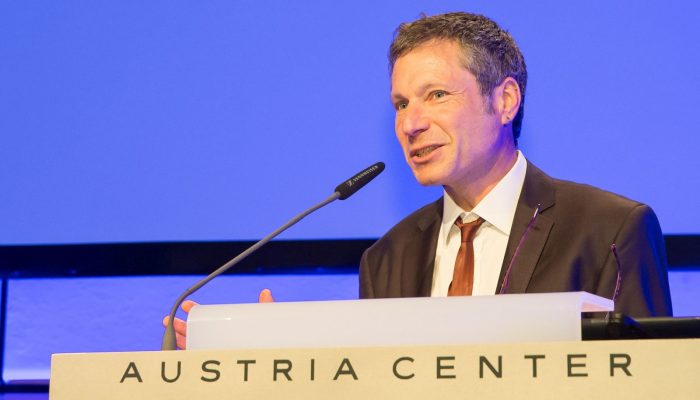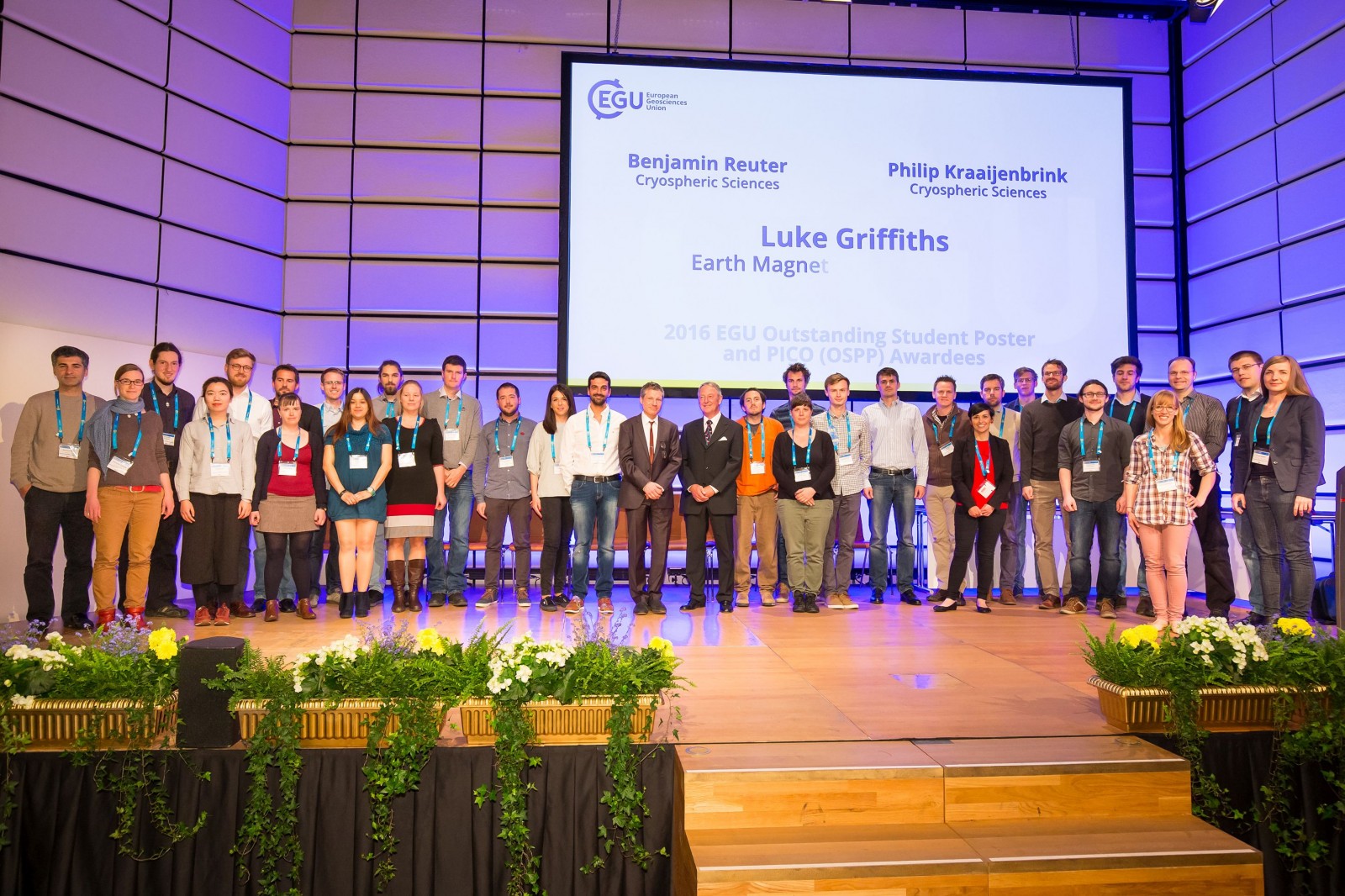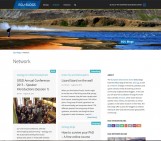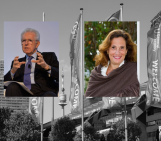
GeoTalk interviews usually feature the work of early career researchers, but this month we deviate from the standard format to speak to Jonathan Bamber, the EGU’s President. Jonathan has a long-standing involvement with the Union, stretching back almost 20 years. Following a year as vice-president, Jonathan was appointed President at this year’s General Assembly in Vienna. Here we talk to him about his plans for the Union, how scientists can stand up for science at a time when it is coming under attack and how the Union plans to foster the involvement of early career scientists (ECS) in its activities.
In the unlikely event that some of our readers don’t know who you are, could you introduce yourself and tell us a little about your career path so far and also about your involvement with the EGU over the years?
I started out with a degree in Physics. I’ve spent the last 20 years in the geography department at the University of Bristol focusing on Earth Observation. In that time, I’ve covered a lot of topics: from oceanography to land surface processes, but glaciology is my core discipline and research area. Most of my work has broadly been in the area of climate change and climate research but also solid Earth geophysics.
I’ve been involved with EGU (actually, it was EGS then) since the late 90s. I used to attend the meetings and I realised there was a gap in the market for cryospheric sciences. I approached Arne Richter [the former General Secretary of EGS] to form the Division of Cryospheric Sciences. I put together a proposal and became secretary of the division at the time and later became president of the division when EUG & EGS merged to form EGU. I spent five years in that role, towards the end of which I proposed (and launched) the open access journal The Cryosphere, which just celebrated its 10th anniversary and publishes about 220 papers per year. I’m very proud of those contributions to the community and feel that they have helped develop the discipline and strengthen it.
It was 2007 when I stepped down from the EGU Council all together although I still attended the General Assembly, of course, and convened various sessions. It was 2015 when the then EGU vice-president, Hans Thybo, suggested I stand in the next presidential elections. I wasn’t at all certain I wanted to take on the role, but decided to go for it because I think it is important to serve the scientific community and colleagues and EGU is an organisation that is close to my heart.
At this year’s General Assembly, you were appointed Union President (after serving as Vice-President for a year). What are the main things you hope to achieve during your two-year term?
There are two main areas that I am very keen to promote and foster:
First, I want to make the organisation [the EGU] more attractive to early career scientists (ECS) and offer them more opportunities, be that more and better short courses, career support and other benefits of attending. For some years now there has been a strong ECS network within the Union and there have been great advances in that direction already.
Second, I’d like to increase the EGU’s opportunities, and those of members, to be involved in policy activities.
Why those two in particular?
There are many things one could do; but having attended the General Assembly for 15 years, there is no doubt that ECS are the future of the discipline, so if we don’t make the meeting attractive and useful for them, what are we here for?
In terms of policy, there are a number of events which have happened in the past few years which make it come into focus.
Certainly, in the UK, it is important that the science we do has impact, and just as important is that we [researchers] understand what the impact of the research we do has. Ultimately, tax payers pay for the research we do, so it is important not to get detached from the role we have in benefiting society in broad terms but also through specific opportunities and activities.
From many years attending the AGU Fall Meeting, I am aware the American Geophysical Union (AGU) has a very well developed and successful policy related programme. It is, of course, simpler for them, as the policy landscape is restricted to one nation and AGU’s headquarters are in Washington. Nonetheless, despite those differences, EGU is not, currently, providing opportunities for engagement in the policy realm in the way we could, for example, with the European Commission and its funding instruments.
Science for policy is not suited to all scientists, and all disciplines that we represent. However, it is important for a large cohort of our membership.

EGU President, Jonathan Bamber (centre left) and EGU Vice-President, Hans Thybo (centre right), stand along side the 2016 EGU Outstanding Student Poster and PICO (OSPP) awardees. Credit: EGU/Pflugel
ECS make up a significant proportion of the Union’s membership. EGU is a bottom up organisation and there is no doubt that ECS have a say in many matters of the Union already, but how do you plan on including ECS further in decision-making processes in the future?
I wouldn’t necessarily classify ECS separately. They are simply geoscientists, just like the majority of our members. It is important, however, for us to show them and highlight the opportunities available for them to be involved in the General Assembly and the Union as a whole.
We have a Union-wide ECS Representative on Council – this gives ECS a good understanding of how the organisation works and gives the individual experience of the machinery involved in running all the activities of EGU. Roles like this give the next generation skills to take on leadership roles in the future too. How do they know how organisations operate if they don’t have opportunities like this?
There are also no barriers to them being involved in convening sessions, organising short courses and proposing activities for the Union to prepare.
It can be intimidating as a junior scientist to be involved in these activities, so it’s important that we make it accessible to them. I think we are making great progress in this direction.
As an established scientist, what advice would you give ECS starting out in their career?
Accountancy pays very well!
More seriously: get involved!
Also, look at your most successful and respected senior colleagues and identify what about them makes them successful and what do you admire in them. Positive role models are very important.
Recently, the scientific process has come under attack. Initiatives such as the March For Science have given scientists opportunities to make their voices heard. What role can the Union play in supporting members wanting to stand up for science?
We can put together advice for how scientists can get their voice heard. The Union’s Outreach Committee is quite active in this regard already.
Trying to make sure that the voice of the geoscience community is heard within Europe is another area where we can contribute. We’ve been involved in an EU Parliamentary meeting, representing EGU, where discussions focused on improving the integration of science and collaboration across Europe.
We also offer policy makers and institutions the opportunities to contact scientists, through our database of experts. We need to make European policy-makers more aware that we can provide that service.
In terms of funding for scientific research, we’ve established links with the President of European Research Council. Jean-Pierre Bourguignon gave a talk at this year’s General Assembly and participated in one of our Great Debates. We also hosted a meeting where senior members of the EGU’s council met with Bourguignon to discuss how the EGU could support the ERC in the future.
As an organisation, it should be our goal to provide our members with a mechanism by which they can communicate with the European Commission and policy-makers.
Last month, the EGU issued a statement condemning President Trump’s decision to pull the USA out of the Paris Climate Agreement. Why is this decision so troubling and, in your opinion, what can Union members do to raise awareness of the challenges facing the globe?
We should communicate the importance of our science: what we know, what we understand, the evidence based facts.
In the absence of evidence based science, how do policy makers reach decisions? They rely on gut instinct, on beliefs, on prejudices… But they should be making them on evidence based science. So, it is crucial that we communicate what we know to the public and policy-makers.
In Europe, a large majority don’t question human influence on climate. They understand it is real and that it’s an issue of upmost importance.
Trump’s decision was about politics not science; it is important to remember that. He didn’t deny that climate change was real, but he was making the decision on an economic basis and that is something else again. Whether it was a wise economic decision or an entirely myopic one is another question altogether. I speak about this in more detail in an open editorial I wrote shortly after the decision was announced.
Geoscientists are, perhaps, more important in terms of policy and the health of the planet than they ever have been before. All the work we are doing in the geosciences has huge implications for policy and for safeguarding our future on the planet.
Jonathan, thank you for talking to me today about a whole range of topics. I’d like to finish this interview by bringing the conversation back around to EGU. We’ve discussed, at some length, what the Union hopes to do for its members and highlighted that there are plenty of opportunities to get involved. So, how exactly do they go about taking a more active role in the Union’s activities?
One of the easiest ways to have your voice heard is by getting involved through your scientific division. Attend your division(s)’s business meeting. Each division has quite a few officers: a secretary, vice-president, secretaries for sub disciplines and so on. There are lots of opportunities there. In general, anyone who wants to put the time in will be welcomed by division presidents because it’s always good to have enthusiastic, dedicated volunteers.
When it comes to the General Assembly in Vienna, anybody can propose a session. If you want to organise a session or a short course, just fire it out there! The call-for-sessions is currently open [until 8th September]. You’ll find all the details online.
If you are interested in policy-related activities do complete the register of experts questionnaire. It doesn’t take long and you’ll find details on our webpages. Make sure you provide as much detail about your expertise as possible. That way we’ll be able to match you up with those who make inquires and opportunities in the most effective way.
Interview by Laura Roberts Artal (EGU Communications Officer)





Clay Huffman
Jonathan Bamber research area glaciology is very interesting to me. I started my research a few years ago.
Bárbara Ferreira
Really enjoyed reading this! Very inspiring interview.